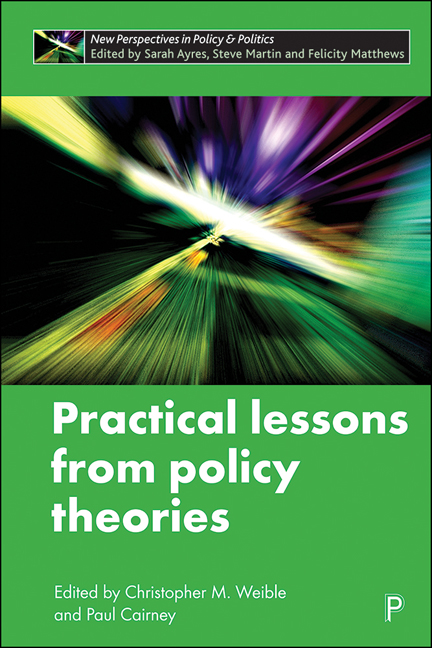Book contents
- Frontmatter
- Contents
- List of figures and tables
- Notes on contributors
- one Purposes and paths in drawing practical lessons from policy theories
- two Three habits of successful policy entrepreneurs
- three Narratives as tools for influencing policy change
- four Using cultural theory to navigate the policy process
- five The lessons of policy learning: types, triggers, hindrances and pathologies
- six Practical prescriptions for governing fragmented governments
- seven Drawing practical lessons from punctuated equilibrium theory
- eight Policy design and the added-value of the institutional analysis development framework
- nine Why advocacy coalitions matter and practical insights about them
- ten Reflections and resolutions in drawing practical lessons from policy theories
- Index
eight - Policy design and the added-value of the institutional analysis development framework
Published online by Cambridge University Press: 05 January 2022
- Frontmatter
- Contents
- List of figures and tables
- Notes on contributors
- one Purposes and paths in drawing practical lessons from policy theories
- two Three habits of successful policy entrepreneurs
- three Narratives as tools for influencing policy change
- four Using cultural theory to navigate the policy process
- five The lessons of policy learning: types, triggers, hindrances and pathologies
- six Practical prescriptions for governing fragmented governments
- seven Drawing practical lessons from punctuated equilibrium theory
- eight Policy design and the added-value of the institutional analysis development framework
- nine Why advocacy coalitions matter and practical insights about them
- ten Reflections and resolutions in drawing practical lessons from policy theories
- Index
Summary
Introduction
Public policies are institutional arrangements that set the official rules of the game for society as we work together to provide public goods and solve complex social dilemmas, such as maintaining orderly and healthy communities, educating the public, protecting vulnerable populations, and sustaining natural resources. Designing policies to manage these complex social problems can be challenging. In part, this is because the institutional arrangements that comprise policies can be complex and may affect a diverse set of actors and issues in ways that may be uncertain or difficult to predict. Scholarship on institutional analysis, particularly from the research that employs the Institutional Analysis and Development (IAD) framework, can offer useful tools to help understand and assess this complexity. Previous assessments and descriptions of the IAD framework, however, have not clearly explained how insights from the IAD can enhance the practical relevance of scholarly research on policy design.
As its name suggests, institutions are at the heart of the IAD framework. Institutions are the rules, norms, and shared strategies that structure human behaviour and choices, and are collectively created, adapted, monitored, and enforced (Ostrom, 2005). Thus, by ‘institutional arrangements’, we are not referring to bricks-and-mortar buildings or political venues. While institutions can be formalised, as written into policy documents, they often are defined by what people have agreed with one another about what they may, must or must not do in relation to other people or to their environment.
How and why people design institutions to solve shared problems, and what makes institutions work, has been the focus of much of the institutional analysis associated with IAD research. As Schlager and Cox (2018, 217) note, the ‘IAD Framework has a problem solving orientation’. However, the intellectual history of this framework and its complexity can make it difficult for scholars and policy analysts who are not trained deeply in the application of the IAD to understand and appreciate this problem-solving orientation. For those who are trained in the IAD approach to policy analysis, the jargon and tacit knowledge associated with this community of scholars also makes it difficult to step back and communicate its core message. This chapter therefore extracts new practical insights and research strategies from IAD scholarship framework.
- Type
- Chapter
- Information
- Practical Lessons from Policy Theories , pp. 151 - 172Publisher: Bristol University PressPrint publication year: 2021

